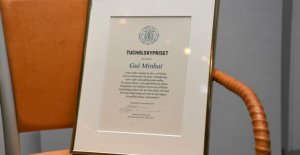"You think because the not is still on the goblins?"
the Words fell on a cold decemberdag in the middle of the Strøget in Copenhagen, where a mother allowed herself to overpower the growing christmas stress and in a moment of irritation over his daughter's childishness let the damning words fell.
In the second you could see on her face that she regretted. "Is there not goblins, Mother?" asked the little girl back.
the Answer melody, as I passed them, with the common not far from the river, and escaped my hearing range. But through my stroll along the julepyntede strokes appeared the rapid exchange, I had struck, again and again in my thoughts.
Why this sudden outbreak? What would really be wrong by a child to believe in goblins?
I Wonder if we each through life need to dare and be able to believe in the sizes and histories may not can stand for the larger dna sample? Surely, we all need clues through life, that isn't built on common sense?
For a child it can be trolls, fairies, goblins and other folks. For the adults it may be God or love to the sagas and stories, that binds us together as people.
We know well, that's great chronicle of the Danish holdings of its locations is more narrative than facts. Anyway, we love the stories of Hagbard and Signe, of Uffe hin Fainthearted, and on the skjoldungen Rolf Krake, in addition to live in the legend has given its name to several of the Danish navy's frigates. The stories are one with us as a people.
Nevertheless rests there as a root in modern society a latent skamfuldhed over it to faith and hope in something other than the scientific.
In the modern Denmark, you know. Faith is for the simple minded – hattedamerne and other crazy types. And immediately a child is approaching femårsalderen, be transferred to it, that mythical creatures did not exist. But what if myth is what keeps us together?
In many christian countries outside of the cold north will people find community in their faith in God. The faith holds them together as a people. But in Denmark, the science has gripped the hearts.
In the schools are taught well enough pligtigskyldigt in christianity, but with the thick line under, that, of course, no service is taking place. You should not like to offend anyone. And on oplysningsmonopolet Danmarks Radio is told well enough about the Bible's miracles, but always with science glasses.
Can a natural phenomenon, mon explain Moses' sharing of The Red Sea? Could extremely low tide mon explain Jesus walking on the sea of Galilee? The faith is treated as a science. However, thus taken, of course, precisely the faith – barnetroen – away. The hearts are cold.
in Particular, the history of, there surely had to be the people's soul, have science dissection taken a firm grip on. In the DR's great storytelling about Denmark is the way to our oldtidssagaer no longer through the myths, but through the laboratories and dna analysis, as a scientific ghoul with kulstofmålinger and other goodies from the world of science will displace the soul of the story.
With skalpellens sharpness mapped Egtvedpigens and Tollundmandens migrations, so you can ask the nagging question: Was the now Danish? Keep the myths now water? Or can we shake 'Denmark's birth certificate'? – as Danmarks Radio unflattering wondering.
the Answer is simple: of Course we can question everything that faith, to be felt and passed on. By myths and sagas, tales and adventure. But what purpose would it serve to dissect the story out in the barren bits? It's an art to beat the common identity – the putty that binds us together as people – to death?
As nissetroen provides the small a optimism and spontaneous glædesstunder in December, provides the faith, the sagas and myths of the people identity and unity. As the flag, whose history also hardly can stand for a more thorough dissection.
Or as our songs, stories and faith, that together with all the rest unspoken we have in common, just bind us together into one.
It's not about believe or not believe – in God, or goblins.
It's all about as a human being to be allowed to rest in more than our brains can understand.
Morten MesserschmidtMorten Messerschmidt, is educated cand.jur and is elected to Parliament for the Danish people's Party in 2019, but have previously served in the Danish Parliament. From 2009 to 2019, he was a member of the European Parliament. He lives together with director and bakkesangerinde Dot Wessman. The author of several books, among other things, the EUROPEAN court of justice. He was born in 1980 in Frederikssund.
Date Of Update: 09 December 2019, 10:00










